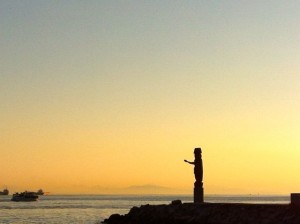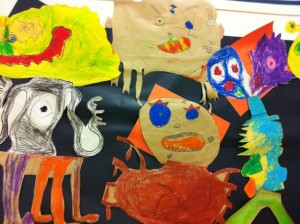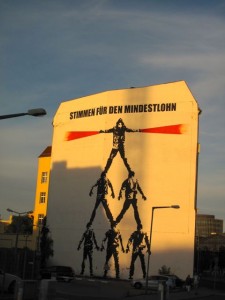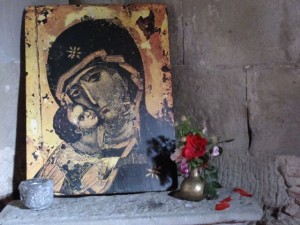The Value of a Shock
In June 2013, a Grade 8 teacher invited me to participate in an event she had organized for her English class.
I accepted, with no qualms, to be a talking book. That is, an individual with whom students could converse. A living book providing real-time dialogue.
On the day of the event, each living book was guided to a different spot in the Rockridge library. The students, in small groups of five or six, rotated from one station to the next on a timed basis. They had spent time preparing for their roles as interviewers and the evidence of how much time their teacher had spent helping them get ready was clear.
Many of the questions they asked me focused on education.
“Is high school the best years of our lives?” One of my favourite questions, to which I answered, “No.” In my view, I explained, high school may be a pinnacle of experience for some, but it was not necessarily so for all. It hadn’t been for me.
One young woman asked for my advice on how best to prepare for university. I didn’t mind this question the first time it was asked, but by the second or third time it was broached, I’d had enough. I suggested that since they were only in Grade 8 they may be better served by focusing on what they had to do now. They had time to agonize over the rest.
There was one question which resonated with me the most. I remember it as “what do you think is the purpose of education?” but in her thank you letter the young woman who’d posed the question wrote it down as “what makes you so passionate about education?” The exact form of the question doesn’t matter because it was her interpretation which has made this into a cherished memory.
“Your answer shocked me. It was not an answer that I expected. You are not passionate about education because you think it makes people smart for a better job in the future, that was what I expected. Instead, you said that education makes us better people. … This is a moral that I will carry with me for my upcoming school years.”
And I do; I believe that education is about making each of us better.
That’s why the chorus for choice in the public education system sometimes rings false. Because those who sing that chorus the loudest are trying to draw a straight line from their children’s education, even as far back as kindergarten and earlier, to success in their lives as adults. There are connections and correlations between the two, but I believe we do a disservice to our young people when we present life as a simple equation of “if you do this, then you will get, or you will be, this”.
Life is complex and nuanced.
Life doesn’t always unroll in a straight line.
And that can be a shock.
And in the face of a shock like that, sometimes all we have to rely on is being the best person we can be.
The Impossibility of Knowing What Is To Be
Here’s the thing: none of us has a crystal ball. Not the pundits nor the prognosticators, some of whom have made very lucrative careers out of saying what they “know” will happen.
In fact, some say the events which shape the human experience are not the outcomes we forecast, but the unexpected occurrences to which we respond. For more on this, read The Black Swan: The Impact of the Highly Improbable by Nassim Nicholas Taleb.
I know I can’t speak to the future with certainty, but as I look towards the fall, I suspect my voice will be a dissenting one.
Why?
Because events are moving quickly in the public education sector with no clear indication of the government’s ultimate objective and yet there seems to be a general complacency about it all.
Here are three red-flag issues for me:
- The removal of the BCPSEA Board points to a profound change in the way bargaining will be conducted in the public education sector. I think BCPSEA paid the price for pursuing a path contrary to the provincial government’s vision. The board’s removal was sudden, swift, and seemingly–and mistakenly in my opinion–unlamented. Whether this is an improvement or not remains to be seen, but I am still looking for assurance that this is not the first step in a series of unilaterally determined shifts which may or may not prove to be publicly beneficial.
- A 10-year labour agreement with the BCTF is seductive and such an easy sell in the court of public opinion. But I’m not convinced, unless the deal is fully funded and increases resources significantly for students, that it can be accomplished in a fair and equitable manner. I am also not convinced that it is in the best interest of the employer as I’ve written about before here.
- Publicly elected school boards make a difference because they represent local interests and are accountable to local communities. The fact that we have a high-performing system today is due in large measure to the way districts (everyone from students to parents to trustees to staff to principals to teachers to support staff) have been able to keep the machine humming despite inadequate funding. Yes, the provincial government spends more per student now than ever before, but add up the costs that have been downloaded without being funded and the increases in expenses which haven’t been covered (including key items such as utility costs, MSP premiums, and carbon offsets) and you’ll see why there’s such a discrepancy. Yes, some boards have run into difficulties, and yes improvements can be made, but the attempt to disregard the government’s role in exacerbating the situation is disingenuous.
So while I may not be able to speak to what the future is bound to bring, I do know that I will continue to speak up and to advocate, even if I’m in the minority, because it doesn’t take a crystal ball to see that a healthy, thriving public education system is the best foundation for all our tomorrows.
A Question of Size
“We may not be big but we’re small!”
As CBC radio listeners know, that’s the motto of the Vinyl Café, the vinyl record store at the heart of Stuart McLean’s storytelling series.
I think the motto counterbalances another common theme of our times: “Bigger is Better”. A concept which often leads to trouble economically, politically, and environmentally.
The Vinyl Café motto is also a good fit for Lions Bay Community School, a primary school in School District 45 which enrolls approximately 60 students per year in kindergarten to Grade 3. A privately run preschool also operates on the premises.
In June, I attended the school’s leave-taking ceremony for its Grade 3s, a ceremony which marks their “graduation” and acknowledges their future status as intermediate students at other schools starting in September.
Lions Bay, it seems to me, is so big in what it does even though it is small.
Why?
Part of it is the setting. Nestled in the forest, the school seems to be swimming in an ocean of green.
Part of it is the architecture. Now over 30 years old, the school is built on an open-concept plan which allows an unparalleled flow between learning spaces and allows the teaching staff an exceptional amount of flexibility.
Part of it is the community. Families who choose to live in Lions Bay have made a specific lifestyle choice and they are active participants in the school because it is a major focus for the community.
There are challenges, too. Because it is so highly dependent on area demographics, enrollment at the school can only be maintained as long as there are young families in the area or willing longer-distance commuters (for example, if Squamish families or Horseshoe Bay residents were to choose the school for their children).
In addition to the excellent teaching staff, the supportive community, and the outstanding physical environment, size is something else that gives Lions Bay an edge. Being small helps the school fulfill its mission statement “to provide a safe learning environment and strive to enable students to become confident learners”.
The size of the school, in my opinion, keeps the student experience at the heart of operations by allowing a higher degree of personal attention. It has also sparked innovation in pedagogical approaches.
These factors have all combined to ensure success for these young students.
Being small can be effective.
Which brings me to the measures being taken to restructure the bargaining framework in BC’s public education system. Measures which I hope are not a prelude to regionalizing or eliminating Boards of Education.
As John Abbott, President of the 21st Century Learning Initiative, cautioned during a visit to West Vancouver earlier this year, losing local governance puts the future of learners at risk by distancing the local community from decision-making.
So here’s what I hope our provincial government and the leadership of BCSTA remember as they work together during the remaining days of summer.
Bigger is not always better.
Artwork by Lions Bay students on display in the gym.
Do I Want To Know?
Ignorance is bliss.
Or so they say.
And as we hurtle through the German countryside, on this train voyage from Berlin to Frankfurt, on the last leg of our summer adventure abroad, I believe it may be true.
Throughout this trip, I’ve had access to wireless connections and have checked my email regularly, followed Facebook postings and Twitter messages, but not to the same extent I do at home.
I haven’t read the newspaper each morning, I haven’t listened to broadcast news, and I haven’t been voraciously consuming the ups and downs of world events, whether trivial or significant. It helps that many of our accommodation spots have not provided access to a television or that we’ve been too busy exploring to watch.
So while I’ve been connected, I haven’t been obsessed and that’s opened room in my thoughts and daily experience to a stronger sense of well-being.
Which is an odd place to be for someone who is an advocate of digesting information regularly, of learning, of being aware that the world is so much more than our immediate circles of influence.
So if ignorance is bliss, why bother with education?
In thinking about this question, I realize how value-laden the field of education is as is the contemplation of what constitutes the qualities of our existence as social beings.
We talk about believing in better, but what’s better?
We talk about the value of knowledge, but what is knowledge?
We talk about leading good lives, but what constitutes a good life?
In addition, as I contemplate the historical record (traveling in Europe seems to make history somehow more real and pressing), I realize that crimes and atrocities, throughout the centuries and in our own day, are or have been committed by well-educated people.
Education has not acted as a barrier to tragedy, war, deprivation, suffering, inequality, and injustice.
And while I have a feeling the key is to keep asking questions rather than settling on fixed answers, there is one conclusion I feel able to draw with some certainty.
The most important result of education is to enable people to become and to be critical thinkers. And while the search for consensus may be integral to making progressive changes (what is progress? why change?), individual voices are needed now more than ever as is tolerance for different points of view.
And that’s a troubling aspect of political life in Canada and elsewhere along with the evolution of our mainstream media systems. It seems the goal is to manipulate citizens into thinking en masse by removing dissension and erasing individuality.
I can’t help feeling that we should – at this point in time and with the lessons of history – know better.
Ignorance may be bliss, but, as my nephew says (he’s recently graduated from the University of Bradford Peace Studies Department) “blissed” ignorance is not just.
Perhaps that’s the ultimate purpose of education then: to establish, maintain, and sustain just societies.
If so, let’s get on with it.
The Tracks Of Her Tears
I saw the mother of a young man cry last week.
Her tears weren’t tears of grief and loss.
Rather, the tracks of her tears captured a story of love, bewilderment, perseverance, disappointment, faith, despair, relief, pride, and thankfulness.
Why?
Her son had graduated.
Such a pedestrian sound to this accomplishment: her son had graduated.
But it’s only pedestrian because high school graduation has become an expected (minimal) norm in our world.
However, it’s a mistake to assume high school graduation is automatic even in a community such as West Vancouver which boasts a 97% graduation rate.
There’s the perception that all the children in this community will make it, that they all have an easy ride.
Wrong.
It’s a mistake to assume that the glittering mantle of expensive housing, disposable income, and stable family is the reality for each child. It’s wrong to assume they will thrive in our high schools.
That’s why we have ACCESS.
Located at West Vancouver Secondary School, ACCESS
“… is an alternate school program designed to provide an opportunity for students who require this unique setting to complete the requirements for high school graduation.
In addition to the basic academic program, ACCESS also provides students with the following opportunities.
- 10 day Bowron Lakes wilderness experience
- Participate in various local outdoor activities
- Access to community youth services
- Work experience
- Apprenticeship
Admission is through an interview process…”
The ACCESS grad luncheon this past week was an opportunity to recognize the accomplishments of remarkable young people who had done what is expected of many, but which was not a guaranteed outcome for them.
And in a society which increasingly favours conformity and compliance, they did so while holding on to their unique forms of self-expression, their standout personalities, and saying “I’ll do what you ask, but I’m doing it my way”.
That is strength of character, courage, and conviction.
At ACCESS collaboration is a lifeline. There’s a dedicated team of teachers and youth workers who guide these students and who are joined by representatives from community partners such as the District of West Vancouver Community Services, the West Vancouver Police Department, Vancouver Coastal Health, the Ambleside Youth Centre, and local businesses.
In hindsight, maybe the tears of that young man’s mother did denote loss of a kind. They reflected the grief she’s carried with her knowing her son’s journey has been immeasurably tougher than many of his peers.
But there was more in her eyes.
There was joy. Despite the obstacles, her son had reached this milestone and was publicly recognized for doing so.
There was hope. Hope that it was, after all, going to be fine.
What more could I ask for than to be associated with a system which provides joy and hope to those who are at risk and vulnerable?
A system that is not taken in by the appearance of the community’s “perfection”, but which understands that unless our “diamonds in the rough” have a place to call their own, then our claims of excellence will ring hollow.




